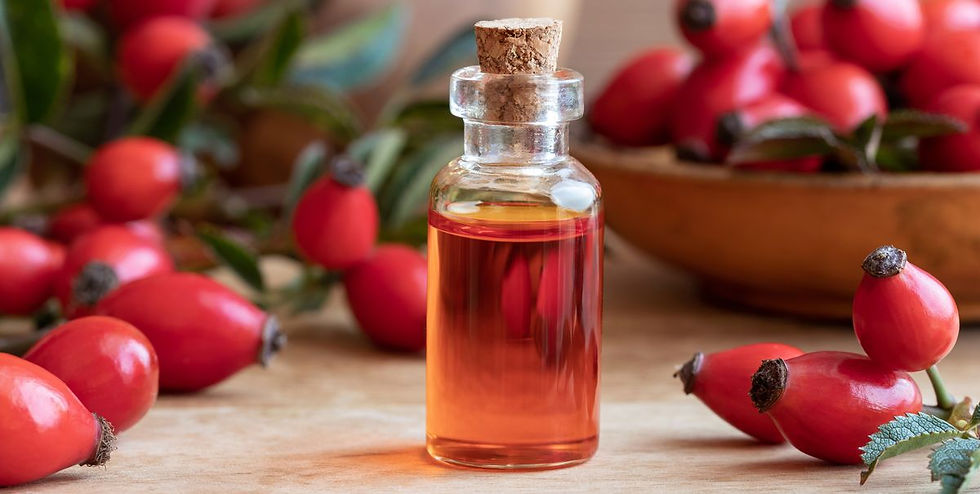Rosehip oil - Benefits, uses & effects
- Team Aequa

- Apr 2, 2022
- 3 min read
Updated: Jun 11, 2022
Rosehip oil is also known as rosehip seed oil. It’s derived from the rosa canina rose bush, which is grown mostly in Chile. Unlike rose oil, which is extracted from rose petals, rosehip oil is pressed from the fruit and seeds of the rose plant. Prized since ancient times for its valuable healing benefits, rosehip oil is loaded with skin-nourishing vitamins and essential fatty acids. It also contains phenols that have been shown to have antiviral, antibacterial, and antifungal properties. Rosehip oil is often used as a carrier oil for essential oils that are too intense to put on your skin directly.
Keep reading to learn more about how rosehip oil can benefit your skin, and how to add it to your skincare routine.

What are the benefits of Rosehip oil?
Rosehip oil has traditionally been used for a variety of purposes, including:
Rosehip oil contains a wealth of essential fatty acids, including linoleic and linolenic acid. Fatty acids help to keep cell walls strong so that they don’t lose water.
Rosehips offer several anti-aging properties, including the ability to keep skin moisturized.
Natural exfoliation with rosehip oil can help reduce dullness and leave you with glowing, vibrant skin.
Rosehip oil is rich in vitamins A and C, which are both necessary for the production of collagen.
Rosehip is rich in both polyphenols and anthocyanin, which may help reduce inflammation. It also contains vitamin E, an antioxidant known for its anti-inflammatory effects.
Rosehip oil is rich in vitamin A. Vitamin A is made up of several nutritional compounds, including retinoids. Retinoids are known for their ability to reduce hyperpigmentation and other visible signs of aging with regular use.
Rosehip oil is rich in essential fatty acids and antioxidants, which are integral for tissue and cell regeneration in the skin.
Like many essential oils, researchers have been working to evaluate the potential health benefits of Rosehip oil and its components.
How to use Rosehip oil?
Rosehip oil is a dry oil that easily absorbs into the skin.
Although it’s generally safe for all skin types, you should perform a patch test before your first use. This will ensure that you aren’t allergic to the oil.
To do this:
apply a small amount of rosehip oil to your forearm or wrist
cover the treated area with a band-aid or gauze
after 24 hours, check the area for signs of irritation
if the skin is itchy or inflamed, you shouldn’t use rosehip oil (see your doctor if the irritation persists)
if the skin doesn’t show any signs of irritation, it should be safe to use elsewhere
Once you’ve done a patch test, you can apply rosehip oil up to twice per day. The oil can be used on its own, or you can add a few drops to another carrier oil or your favorite moisturizer.
Rosehip oil can go rancid quickly. To help extend its shelf life, store the oil in a cool, dark place. You can also store it in your refrigerator.
Though it’s slightly more expensive, cold-pressed, organic rosehip oil is recommended for purity and best results.
Are there any side effects?
Rosehip oil is generally safe for all skin types, but an allergic reaction is not uncommon. Before using rosehip oil for the first time, you should perform a patch test to make sure your skin can tolerate the oil.
See your doctor if you begin to experience:
red, itchy skin
itchy, watery eyes
scratchy throat
nausea
vomiting
Anaphylaxis is possible in severe cases of allergic reactions. Seek immediate emergency medical attention if you begin experiencing:
difficulty breathing
wheezing
swollen mouth, throat, or face
rapid heartbeat
stomach pain
The bottom line!
Rosehip oil has a long history as a therapeutic remedy and beauty product. It’s full of vitamins, antioxidants, and essential fatty acids that are all valued for their ability to nourish the skin.
Scientific studies showing rosehip oil’s promise make it an intriguing option for anyone looking to reduce the visible signs of aging, clear up scarring, or otherwise improve their skincare routine. Not only is it reasonably affordable and easy to use, but it’s also considered generally safe for all skin types.
Always talk to your doctor if you have any questions or concerns before using Rosehip oil.